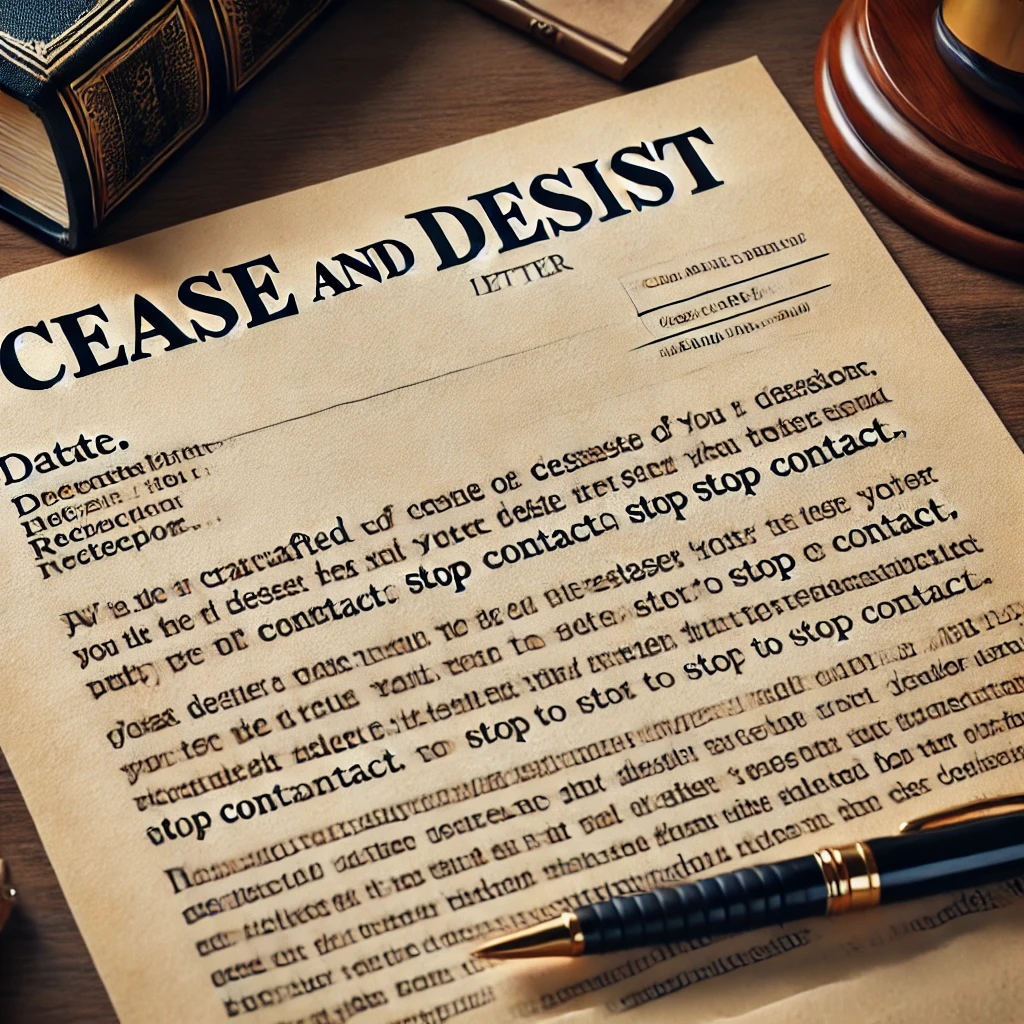A recent study by the Consumer Financial Protection Bureau (CFPB) showed that over 25% of people with debt were bothered by collectors four or more times a week. This shows how common harassment is for many Americans. Luckily, the Fair Debt Collection Practices Act (FDCPA) gives a strong way for consumers to stop this: the cease and desist letter.
Sending an FDCPA cease and desist letter asks debt collectors to stop contacting you about a debt. Once they get your letter, they must stop calling you, except for one last notice about what they plan to do. This guide will help you understand your rights under the FDCPA. It will also show you when and how to send a cease and desist letter to stop creditor calls and contact.
When to Send a Cease and Desist Letter
If debt collectors keep calling you about a debt you don’t want to talk about, it’s time for a cease and desist letter. This letter stops debt collection calls and protects your rights under the Fair Debt Collection Practices Act (FDCPA).
Repeated Contact from Debt Collectors
Debt collectors calling you too much is a common reason for a cease and desist letter. The FDCPA limits how often and when collectors can contact you. If they call you too many times or at bad hours, you can stop them from contacting you.
Debt Past the Statute of Limitations
Being contacted about a debt that’s too old is another reason for a cease and desist letter. Each state has a time limit for collecting debts, called the statute of limitations. If a debt is past this limit, you don’t have to pay it. A cease and desist letter can stop collectors from bothering you about these old debts.
Incorrectly Identified Debts
If collectors are bothering you about a debt that’s not yours, send a cease and desist letter. It tells collectors they made a mistake. This stops them from bothering you with wrong information.
Remember, a cease and desist letter doesn’t erase the debt or make you not have to pay it if it’s real. But, it does stop the constant calls. It gives you time to think about your money and look into how to handle the debt.
Crafting Your FDCPA Cease and Desist Letter
When you face debt collection harassment, knowing your rights is key. Sending a cease and desist letter to the collector can help. This letter tells them to stop contacting you.
Essential Elements to Include

To make a strong cease and desist letter, make sure it has these parts:
- The date of the letter
- Your full name and address
- The debt collector’s name and address
- The account number(s) for the alleged debt(s)
- A clear statement asking the collector to stop all contact with you, your family, friends, and employer
- A request for the collector to prove the debt in writing
Keep a copy of the letter for your records. It could be important if you need to take legal action against the collector for breaking your rights under the FDCPA.
Information to Avoid
Be careful what you put in your cease and desist letter. Don’t say you owe the debt; call it the “alleged debt” instead. This protects your rights and stops the collector from using your letter against you in court.
Also, don’t give out more personal info than your name and address. Debt collectors might use this to bother you or your loved ones more.
Sample Cease and Desist Letter Templates
We’ve given you a sample cease and desist letter template to use:
[Your Name]
[Your Address]
[City, State ZIP Code][Date]
[Debt Collector’s Name]
[Debt Collector’s Address]
[City, State ZIP Code]Re: Account Number(s) [XXXXXX, YYYYYY]
Dear [Debt Collector],
I’m asking you to stop all contact with me, my family, friends, and employer about the alleged debt(s) above. This is under my rights from the Fair Debt Collection Practices Act (FDCPA).
I also want you to send written proof of the alleged debt(s). This should include the original creditor’s name and address, the debt amount, and other important details.
Remember, any more contact from your company, except for the proof or legal action news, will be seen as harassment. This could lead to legal action.
Sincerely,
[Your Name]
Using this template and the key parts, you can tell the collector to stop debt collection communication. This protects your rights under the FDCPA law.
Sending Your Cease and Desist Letter

After making your cease and desist letter, it’s key to send it right to halt debt collection efforts. Make sure to use certified mail with a return receipt requested. This proves the debt collector got your letter, which is important for future legal steps.
If you have many debts with one collector, write a letter for each one. This avoids confusion and makes sure all debt collection talks are clear. Keep your letters and the return receipts safe for your records.
The FDCPA lets you stop debt collectors from contacting you. Using this right can ease the stress of constant calls and letters.
After your cease and desist letter, the debt collector must stop calling you. They can send one more message to tell you about their next steps. This might include:
- Confirmation that they will stop all contact
- Notice of their plan to sue you
- Details about selling or giving your debt to another collector
Watch your credit report closely after sending your cease and desist letter. If the collector keeps contacting you or acts badly, you might need to take more legal steps to protect your rights.
What to Expect After Sending a Cease and Desist Letter
After you send your cease and desist letter, know what might happen next. Debt collectors must stop bothering you, but remember a few things.
Debt Collector’s Final Contact
The debt collector can contact you one last time after your letter. They might tell you about actions they plan, like filing a lawsuit. Pay attention to this last message. It could show what they plan to do next.
Potential Legal Action from Debt Collectors
If the debt is real and they can’t contact you, they might go to court. They could file a lawsuit against you. If you get a summons and complaint, answer quickly to avoid a default judgment.
A default judgment means the court might side with the debt collector. This could lead to taking money from your paycheck or bank account.
Sending a cease and desist letter doesn’t erase the debt if it’s real. The collector can still try to collect in other ways, like taking legal action. But, it stops them from bothering you and gives you some control.
If you’re not sure about the debt or think the collector broke the law, get legal advice. A lawyer who knows about consumer protection can help you. They can guide you through the process and protect your rights. They can also help with proving the debt is valid and defending against lawsuits.
Wrap-Up
The Fair Debt Collection Practices Act (FDCPA) gives you the power to stop debt collectors from bothering you. By sending a cease and desist letter, you can legally stop the harassment. But remember, this doesn’t erase debts or stop collectors from suing you to get what they want.
If a collector still takes legal action after your letter, answer the court summons quickly. This helps you keep your rights and share your side of the story. If a collector breaks your rights, you can complain to the Consumer Financial Protection Bureau or talk to a lawyer for more help.
The FDCPA is there to protect you from unfair debt collection methods. By knowing your rights and acting on them, like sending a cease and desist letter, you can protect your finances. Stay informed, stand up for your rights, and get legal advice if debt collectors won’t stop bothering you.
Key Takeaways
- The FDCPA protects consumers from unfair and harassing debt collection practices
- Sending an FDCPA cease and desist letter can stop debt collector harassment
- Debt collectors must cease contact after receiving a cease and desist letter, with limited exceptions
- Consumers should send a cease and desist letter when faced with repeated contact, debts past the statute of limitations, or incorrectly identified debts
- A well-crafted cease and desist letter includes essential elements and avoids providing unnecessary information
Cease and Desist for Debt Collection: Common Questions
How can I stop debt collector harassment?
After they get the letter, they must stop contacting you. They can only make one more call or send a notice to tell you about actions they plan to take.
When should I send a cease and desist letter to a debt collector?
What should I include in my FDCPA cease and desist letter?
Don’t say you owe the debt. Call it the “alleged debt” instead.
How should I send my cease and desist letter to ensure my rights are protected?
What happens after I send a cease and desist letter to a debt collector?
This way, you won’t get a default judgment. A default judgment could lead to taking money from your wages or bank account.

